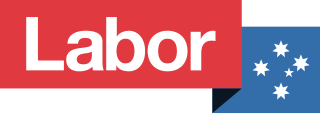
The Australian Labor Party (ALP), also simply known as Labor, is the major centre-left political party in Australia, one of two major parties in Australian politics, along with the centre-right Liberal Party of Australia. The party has been governing federally since being elected at the 2022 election, and with political branches in each state and territory, they are currently in government in New South Wales, Queensland, South Australia, Victoria, Western Australia, the Australian Capital Territory, and the Northern Territory – Tasmania is the only state or territory where they currently form the opposition. It is the oldest continuous political party in Australia, being established on 8 May 1901 at Parliament House, Melbourne, the meeting place of the first federal Parliament.

The politics of the United Kingdom functions within a constitutional monarchy where executive power is delegated by legislation and social conventions to a unitary parliamentary democracy. From this a hereditary monarch, currently Charles III, serves as head of state while the Prime Minister of the United Kingdom, currently Rishi Sunak, serves as the elected head of government.
The Labour Party is a social-democratic political party in the Netherlands.
The Co-operative Party is a centre-left political party in the United Kingdom, supporting co-operative values and principles. Established in 1917, the Co-operative Party was founded by co-operative societies to campaign politically for the fairer treatment of co-operative enterprise and to elect 'co-operators' to Parliament. The party's roots lie in the Parliamentary Committee of the Co-operative Union established in 1881.

The Greens – The Green Alternative is a green political party in Austria.
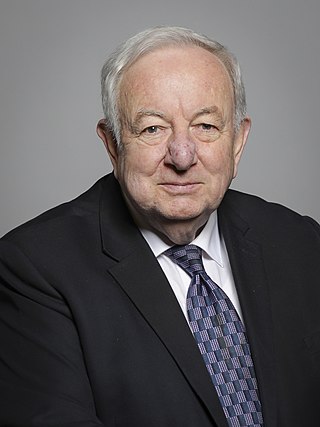
George Foulkes, Baron Foulkes of Cumnock PC is a British politician and life peer who served as Minister of State for Scotland from 2001 to 2002. A member of the Scottish Labour Party and Co-operative Party, he was Member of Parliament (MP) for Carrick, Cumnock and Doon Valley, formerly South Ayrshire, from 1979 to 2005. He was later a Member of the Scottish Parliament (MSP), as one of the additional members for the Lothians region, from 2007 to 2011.

The European Green Party (EGP), also referred to as European Greens, is the European political party that represents national parties from across Europe who share Green values. The European Greens works closely with the Greens–European Free Alliance (Greens/EFA) parliamentary group in the European parliament which is formed by elected Green party members along with the European Free Alliance, European Pirate Party and Volt Europa. The European Greens' partners include its youth wing the Federation of Young European Greens (FYEG), the Green European Foundation (GEF) and the Global Greens family.

The United Kingdom European Communities membership referendum, also known variously as the Referendum on the European Community (Common Market), the Common Market referendum and EEC membership referendum, took place under the provisions of the Referendum Act 1975 on 5 June 1975 in the United Kingdom to gauge support for the country's continued membership of the European Communities (EC) — often known at the time as the European Community and the Common Market — which it had entered two-and-a-half years earlier on 1 January 1973 under the Conservative government of Edward Heath. The Labour Party's manifesto for the October 1974 general election had promised that the people would decide through the ballot box whether to remain in the EC.

The 1999 European Parliament election was the United Kingdom's part of the European Parliament election 1999. It was held on 10 June 1999. Following the European Parliamentary Elections Act 1999, it was the first European election to be held in the United Kingdom where the whole country used a system of proportional representation. In total, 87 Members of the European Parliament were elected from the United Kingdom across twelve new regional constituencies.
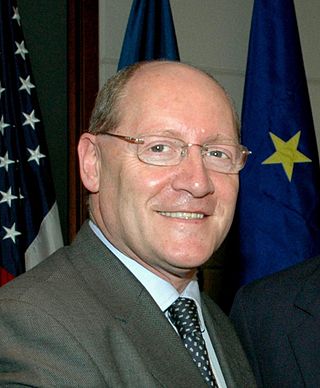
The 2004 European Parliament election was the United Kingdom's part of the wider 2004 European Parliament election which was held between 10 and 13 June 2004 in the 25 member states of the European Union. The United Kingdom's part of this election was held on Thursday 10 June 2004. The election also coincided with the 2004 local elections and the London Assembly and mayoral elections. In total, 78 Members of the European Parliament were elected from the United Kingdom using proportional representation.
General elections were held in South Africa in August 1984 to elect Coloured and Indian representatives to their respective houses of the Tricameral Parliament. The Coloured elections for the House of Representatives took place on 22 August, and resulted in a victory for the Labour Party, headed by the Reverend Allan Hendrickse, which won 76 of the 80 seats. The Indian elections for the House of Delegates were held on 28 August and saw the National People's Party emerge as the largest party, winning 18 of the 40 seats. The Indian elections were opposed by the United Democratic Front and were marked by boycotts and protests. Despite the Prohibition of Political Interference Act of 1968 which banned mixed-race political parties, nine Indian members of Hendricke's Labour Party stood as independents, one of whom won a seat and subsequently joined the NPP.
The 1983 Labour Party leadership election was an election in the United Kingdom for the leadership of the Labour Party. It occurred when then leader Michael Foot resigned after winning only 209 seats at the 1983 general election, a loss of 60 seats compared to their performance at the previous election four years earlier. This was the worst showing for Labour since 1935 until 2019.
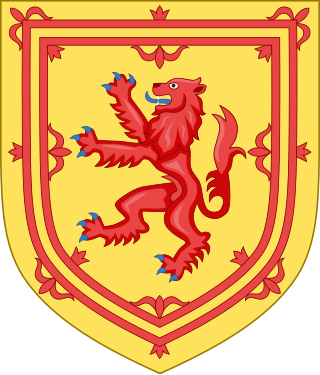
The 1980 Glasgow Central by-election was a by-election held on 26 June 1980 for the British House of Commons constituency of Glasgow Central, following the death of its sitting MP, Thomas McMillan.
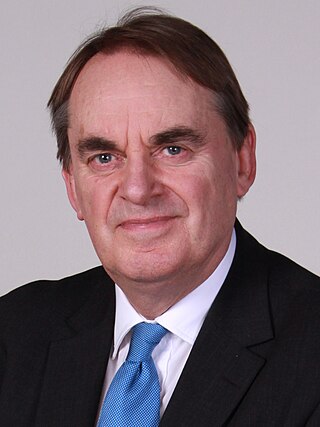
The 2009 European Parliament election was the United Kingdom's component of the 2009 European Parliament election, the voting for which was held on Thursday 4 June 2009. The election was held concurrently with the 2009 local elections in England. In total, 72 Members of the European Parliament were elected from the United Kingdom using proportional representation.
The 1981 Labour Party deputy leadership election took place on 27 September 1981 when Tony Benn unsuccessfully challenged the incumbent deputy leader Denis Healey at the party conference. Healey had been elected unopposed as deputy leader in the previous year.

The Liberal Democrats are a liberal political party in the United Kingdom, founded in 1988. Since the 1992 general election, with the exception of the 2015 general election, they have been the third-largest UK political party by the number of votes cast. They have 15 members of Parliament in the House of Commons, 84 members of the House of Lords, four Members of the Scottish Parliament and one member in the Welsh Senedd. The party has over 2,500 local council seats. The party holds a twice-per-year Liberal Democrat Conference, at which party policy is formulated. In contrast to its main opponents' conference rules, the Lib Dems grant all members attending its Conference the right to speak in debates and vote on party policy, under a one member, one vote system. The party also allows its members to vote online. The party served as the junior party in a coalition government with the Conservative Party between 2010 and 2015; with Scottish Labour in the Scottish Executive from 1999 to 2007, and with Welsh Labour in the Welsh Government from 2000 to 2003 and from 2016 to 2021.

Glenn Bedingfield is a Member of the Parliament of Malta and Government Whip.
The 1992 Labour Party deputy leadership election followed the Labour Party's failure to win the 1992 general election and the subsequent resignation of deputy party leader Roy Hattersley. The ballot took place on 18 July 1992 at Labour Party Conference. Affiliated organisations had 40% of the vote, while Constituency Labour Parties and the Parliamentary Labour Party had 30% each in the electoral college.

The Social Democratic Party (SDP) was a centrist to centre-left political party in the United Kingdom. The party supported a mixed economy, electoral reform, European integration and a decentralised state while rejecting the possibility of trade unions being overly influential within the industrial sphere. The SDP officially advocated social democracy, but its actual propensity is evaluated as close to social liberalism.

Alex Agius Saliba is a Maltese politician, Member of the European Parliament since 2019 for the Labour Party.














